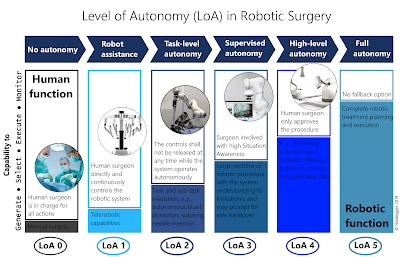Level of Autonomy for surgical robotics
Our new article has been published in the 2nd issue of the IEEE Trans. on Medical Robotics and Bionics: "Autonomy for Surgical Robots: Concepts and Paradigms".
"Robot-assisted and computer-integrated surgery provides innovative,
minimally invasive solutions to heal complex injuries and diseases. The
dominant portion of these surgical interventions has been performed with
master–slave teleoperation systems, which are not capable of autonomous
task execution or cognitive decision making. Much of the most advanced
tech-nologies foundered on the drawing boards or at the research labs
for a long time, partially due to the fact that the surgical domain is
resistant to the introduction of new hazards via the increased
complexity of novel solutions. It has been seen with similar, heavily
regulated areas that internationally accepted standards can facilitate
the adoption of new technologies in a safe manner. This article reviews
the existing autonomous capabilities of surgical robots, and
investigates the major barriers of development presented by the lack of
autonomy benchmarks and standards. The emerging safety standard
environment is presented, as a key enabling factor to the
commercialization of autonomous surgical robots. A practical scale is
introduced to assess the Level of Autonomy of current and future
surgical robots. Regarding the forthcoming robotic platforms, it is
crucial to improve the transparency of the regulatory environment,
streamline the standardization framework and increase the social
acceptance."
Source: IEEE Transactions on Medical Robotics and Bionics, MAY 2019, Volume: 1, Issue:2 On Page(s): 65-76 DOI: 10.1109/TMRB.2019.2913282



Comments